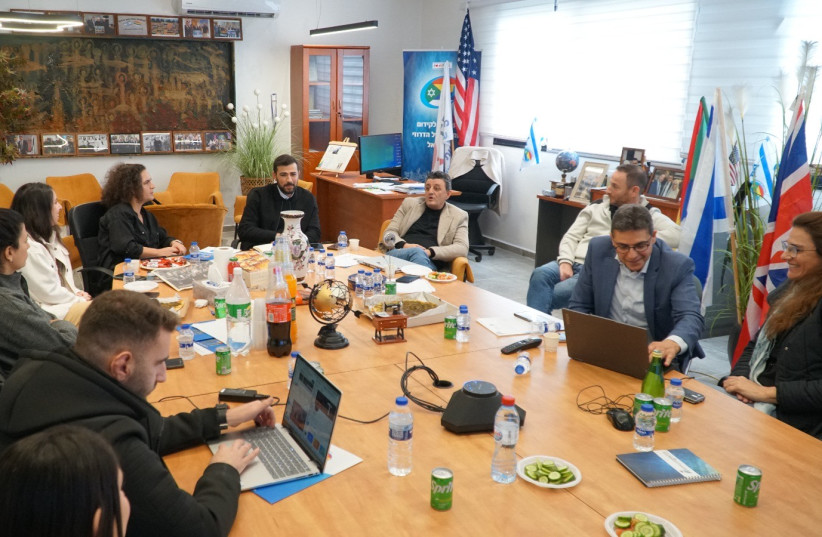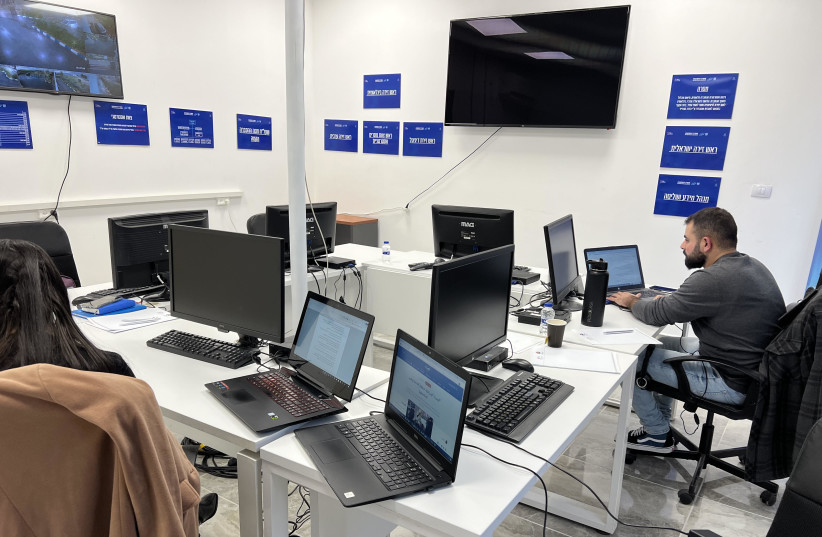Husein, 31, spoke to the Jerusalem Post on Thursday from the Druze town of Usfiya and insisted on showing the magnificent greenery of Mt. Carmel around him.
“This is the western neighborhood of town. People from all religions and even people from abroad come and live here due to the proximity to Haifa University. It’s a microcosm of Israeli society.”
He’s married, has two children, and has served for over ten years in the IDF, first in the artillery brigade and then in the intelligence corps. Now Hussein works as part of a content-creating war room established within DTech (short for Druze Tech), an initiative to accelerate the integration of Israeli Druze into the hi-tech sector.
“Before October 7, Druze society in Israel was caught in the midst of an ongoing crisis, against the backdrop of the Nation-State law and the Kaminitz Law,” Hussein explains; the former referring to the 2018 Basic Law granting the Jewish people alone the right to self-determination, and Hebrew the status of only official language; and the latter referring to a law strengthening law enforcement options in the field of unauthorized building.
Hussein continues: “The Nation State law may not have any technical implications, or maybe it only has ones that we will find in the long term, but the second law affects our everyday ability to plan and build for future generations.
“It’s been over 70 years, and nobody seems to have any willingness or ability to solve it. At first, I thought it was solely our blame, as our local councils truly lack the required professionalism. But as I dug deeper, I discovered that they share the blame with the Ministry of Interior, which isn’t much of a partner and does not allocate any budgets nor does it make any efforts to solve this issue.”
Hussein foresees that the next generation will pose a strategic challenge. “If I grew up with my grandfather’s stories about the relations between Druze and the Yishuv, enlisted in the army, etc. – the next generation will already grow into a reality where the main theme is these laws and the feelings of being deserted. Unfortunately, we may be seeing a decline in enlistment rates and identification with the state.
Then Hussein quickly clarifies: “Our crisis is with the government, not with the state. If I personally come across some form of racism, I have my history and my family’s experience to counter it. But unfortunately, that is not the case in this reality which the next Druze generation lives in.”
And then came October 7. “Our society enlisted immediately and without hesitation. This includes Druze activists who were some of the strongest voices from the large protests we saw last year and even before that; some of which were contemplating not showing up for reserve duty at all ever again. Some were injured during the fighting and went straight back in. They said that a war is a war, and it’s not even a question. Again, we are in pain and feel disappointed in the government, but we still stand strong with the state.”
Israel's Druze population suffered their own wartime losses
Seven Druze warriors fell during the battles against Hamas and other fundamentalist terrorist groups in Gaza. “There used to be a specific Druze battalion called Herev (sword) where most Druze would enlist without much choice. Then that battalion was dismantled, and we started seeing more and more Druze representation in other units, including elite ones. Much of it is thanks to Hebrew courses provided by the IDF, which help young Druze soldiers to fit in more properly and try out new opportunities.”
On October 7, Hussein was still on active duty. He joined the war room after he was released a couple of weeks ago, following what he describes as being impressed by both the idea and the execution. “I’m also drawn into this field of innovation, the Druze society, and the connection to Israel.” Hussein now runs the war room himself, which is comprised of six content creators, including a professional photographer and filmmaker.
The war room started after Koftan Halabi, head of the local council, learned that the Diaspora Ministry was looking to support local initiatives during the war. Halabi had been an Israel advocate in the past, speaking with Jewish communities abroad, and after October 7, he connected with “Kolot Israel,” an initiative looking to amplify pro-Israel voices online. “They had the idea of setting up a war room to create content in Arabic, as there isn’t much competition in the field,” adds Hussein. “Today, the war room has no strings attached, and it does not operate under any ministry,” he adds, explaining that it grants them more freedom to act according to their knowledge and beliefs.
“The word ‘Hasbara’ is nowadays phonetically transcribed and used in Arabic in a negative way to mean propaganda,” explains Hussein. “Many across the Arab world are sure that the October 7 events were either staged or completely made up. This is a different audience that must have its tactics and strategies while being approached.
“We amplify Arab Israeli voices who are more authentic than the regular faces promoting Israeli messages in Arabic,” he says, adding that they tend to stay away from identifying as Druze due to what he describes as an overall negative sentiment towards the Levantine ethno-religious group in mainstream Arabic speaking spheres.


